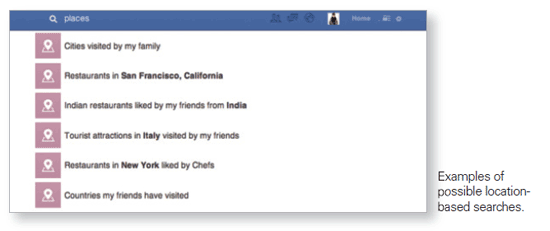Is Facebook's Graph Search a Game Changer?

Thanks to an audience of more than 1 billion monthly active members, Facebook doesn't just have big data - it has enormous data, and the world's largest social network is finally ready to put that data to good use with the release of Graph Search. Facebook is ready, but are brand marketers?
Graph Search Explained
Facebook's previous search functionality was lackluster at best, because it only turned up results for people, pages, groups or apps before directing users to Bing search results. Graph Search aims to solve this problem by allowing users to conduct phrase-based queries to discover alternative information based on data that Facebook has collected from its members over time. For example, someone can conduct a search for "music my friends like," and Graph Search will provide that person with a personalized list of musicians and bands that their friends have liked, along with other data, including the names of friends who have liked a certain artist and how many total likes that artist has on Facebook.
Essentially, Graph Search's functionality will provide users with a new way to explore their connections. In fact, a blog post from the social network states, "Facebook's mission is to make the world more open and connected. The main way we do this is by giving people the tools to map out their relationships with the people and things they care about. We call this map the graph. It's big and constantly expanding with new people, content and connections. There are already more than a billion people, more than 240 billion photos and more than a trillion connections."
At the time of this writing, Graph Search is in beta and only available to a limited number of Facebook members. The first iteration of the new search feature focuses on four main areas: people, photos, places and interests. This allows members to conduct personalized searches for a variety of information that ranges from casual questions like "games my friends like" to direct ones like "restaurants nearby." So naturally, the next question is how will Graph Search impact businesses?

The Graph Search Effect
While Graph Search is sure to influence how brands execute their social media strategies, it also has the potential to take business away from popular location-based services like Yelp and Foursquare.
More than 600 million users visit the social network on a daily basis, and with Graph Search, they may have less reason to use a different service to find nearby businesses. Moreover, Graph Search compiles its results in a visually appealing way and provides users with information that is unavailable on services like Yelp and Foursquare, such as the names of friends who have liked or checked into a business and when.
That being said, if Graph Search truly does become the search feature that Facebook wants it to become, businesses with Facebook Pages will want to optimize their social strategies to ensure that their brand is among the top results when a search is conducted. However, appearing first in the search results will be easier said than done.
Optimizing for Graph Search
Although little is known about Graph Search, there are a few social best practices that Page managers should leverage now.
The most important thing to know about Graph Search is that likes will likely matter - a lot. Search results are based on Facebook's understanding of a brand's follower counts, which means that a business with a large fan base will be more likely to turn up in the results for various searches. Likes will not be the only factor that will determine where businesses end up in Facebook's Graph Search results, however. Expect other interaction types, such as check-ins to be influential, as well. For example, the number and recency of check-ins may help brands appear high on search results. What this means is that brands should start focusing on fostering engagement with their fans, which can be done through a combination of publishing compelling content and offering incentives for specific actions, such as discounts on in-store purchases when a customer checks in through Facebook.
Aside from encouraging engagement with fans, Facebook suggests that brands also continue to invest in their profile and make sure it is complete and updated. Page managers should verify that the name, category, vanity URL and information within their Page's About section is all correct. Once all of these things have been taken care of, Page managers (along with the rest of the 'Net) will have to sit back and watch how the new search feature will influence user activity on the rest of the Web and in the real world.
The Future of Graph Search
Unsurprisingly, there have been many theories floating around regarding Graph Search since its Jan. 15 launch.
Graph Search will undoubtedly affect location- based platforms, as previously mentioned, but the new feature could also impact the broader search marketing industry as a whole. The reason? If Facebook can't find results for a member's query, it directs users to Bing for Webbased results (as it did previously). The difference is, however, that Graph Search is much more robust than Facebook's previous search offering, and if members start using this feature on a regular basis, they could end up on Bing more often, at which point it is up to Bing to keep them coming back. While it is far too soon to call this new search functionality a Google killer, it does have the potential to improve Bing's market share.
Yet, the biggest question surrounding Graph Search is whether or not the social network will launch a new ad format for Graph Search exclusively. While the social network hasn't launched any new ad formats that integrate with Graph Search as of this writing, Facebook did note that brands can launch an ad within sponsored results, which will appear to people whether or not they have Graph Search.
Only time will tell what type of impact Graph Search will have on the Web, but it is safe to say that this feature definitely has the potential to be a game changer.
: More from Website Magazine :
The Local Rivalry
The momentum of mobile makes location based services more helpful than ever before for consumers. Discover which platforms are worth checking into with this comparison chart of location-based services.









